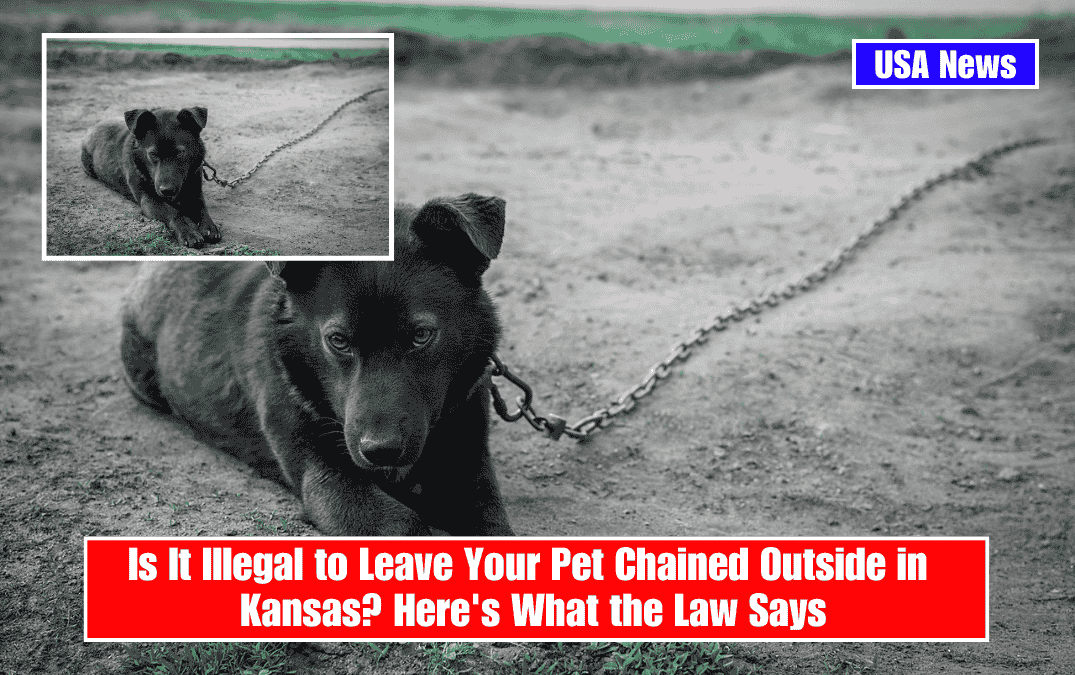The legality of leaving a pet—especially a dog—chained or tethered outside in Kansas depends on where you live. Kansas does not have a statewide law that outright bans chaining or tethering dogs, but several cities have enacted their own ordinances that strictly regulate or limit the practice. In addition, all pet owners must comply with state animal cruelty laws, which can apply if tethering causes harm or neglect.
Statewide Law: Animal Cruelty and Tethering
- No Statewide Ban on Tethering: Kansas law does not prohibit chaining or tethering a dog outside across the entire state. Tethering is technically legal in most places, provided it does not cause harm to the animal.
- Cruelty to Animals: Under Kansas Statute 21-6412, animal cruelty includes knowingly mistreating, neglecting, or abandoning an animal. If a dog is chained in a way that causes injury, distress, or denies access to food, water, or shelter, the owner could be charged with animal cruelty—a Class A misdemeanor on the first offense, and a felony for repeat offenses.
- Improper Tethering as Cruelty: If the tether is too short, too heavy, or causes pain, or if the animal is left without proper care, authorities may prosecute under animal cruelty statutes.
Local Ordinances: City-Specific Rules
Wichita
- Strict Tethering Limits: It is illegal to keep a dog chained or tethered for more than one hour at a time. After a three-hour break, the dog may be tethered again for up to one hour, but never more than three hours total in a 24-hour period.
- Tether Requirements: The tether must be at least 10 feet long and weigh less than 1/8 of the dog’s body weight. It must not cause injury or restrict the dog’s movement, and must be attached to a properly fitted collar.
- Penalties: Violating these rules can result in fines up to $1,000 and/or up to one year in jail.
Lawrence
- Similar Restrictions: Lawrence prohibits chaining a dog for more than one hour at a time, with a maximum of three hours per day and required three-hour breaks between periods.
- Enforcement: Violations can lead to fines (minimum $100) and even jail time (up to six months).
Other Cities
- Some Kansas cities may have their own ordinances, so always check with your local animal control or city government for specific rules.
Leash Laws and Confinement
- Wichita Leash Law: All dogs must be confined by a leash, rope, chain, or within a fenced area or building. However, this does not override the city’s anti-chaining time limits.
- Electronic Fencing: Electronic fencing is considered adequate confinement if clearly marked and the animal is properly equipped.
Best Practices and Legal Risks
- Always Provide Care: Even where tethering is legal, you must provide adequate food, water, shelter, and ensure the tether does not cause harm.
- Avoid Continuous Chaining: In cities with anti-chaining ordinances, continuous or excessive chaining is illegal and can result in fines or criminal charges.
- Check Local Laws: Because Kansas law allows cities to set their own rules, local ordinances may be stricter than state law.
It is not universally illegal to leave your pet chained outside in Kansas, but in many cities—including Wichita and Lawrence—strict limits make continuous or prolonged tethering a crime. Even where tethering is allowed, it must not harm the animal or violate cruelty statutes. Always check your local ordinances and ensure your pet’s welfare to stay within the law and avoid penalties.
SOURCES:-
[1] https://www.wichita.gov/DocumentCenter/View/12857/Chaining-PDF
[2] https://dogtime.com/reference/106550-kansas-animal-cruelty-law-dog-chain
[3] https://www.peta.org/issues/animal-companion-issues/ordinances/wichita-kansas/
[4] http://www.unchainyourdog.org/news/Wichita.htm
[5] http://www.unchainyourdog.org/news/040630CommissionersLimit.htm








